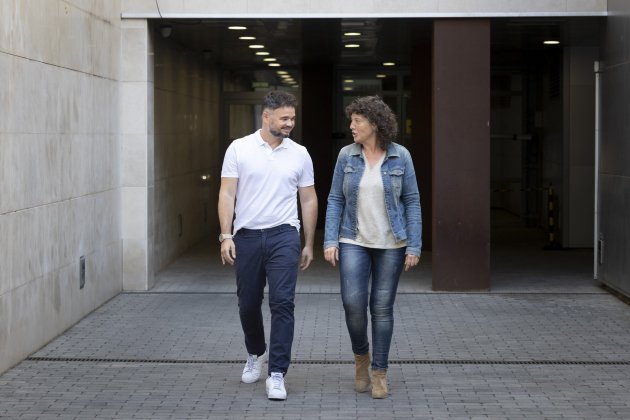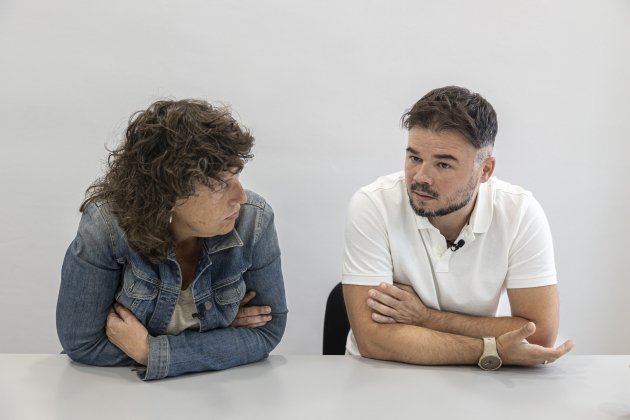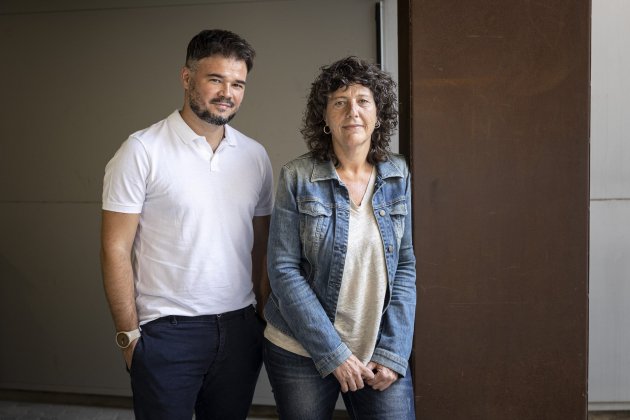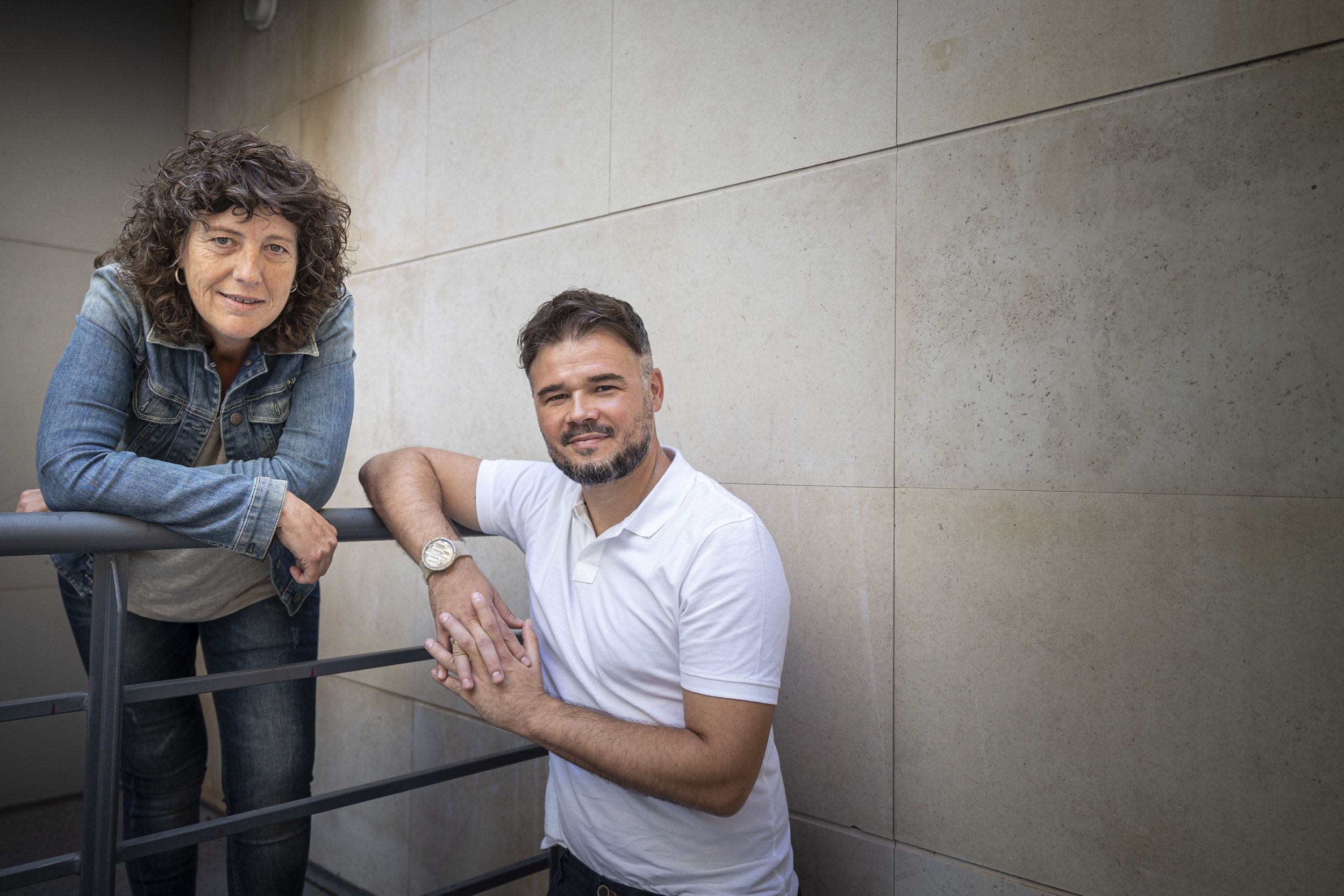In June, the Catalan Republican Left (ERC) presented its ticket for Spain's 2023 general election, headed by Gabriel Rufián i Romero (Santa Coloma de Gramenet, 1982) and Teresa Jordà i Roura (Ripoll, 1972). The leadership of the Republicans has entrusted Rufián to lead the candidacy for the Congress of Deputies for the fourth time - the first time he did so was in the elections of December 20th, 2015 - and with Jordà, to form a tandem in Madrid. The former Catalan minister for climate action has left the government of the Generalitat in order to dedicate herself to the Spanish lower house, where she is already experienced, having been an MP between 2011 and 2018. Rufián, who is also a city councillor in Santa Coloma de Gramenet, and Jordà, who was mayor of Ripoll (2003-2011), receive a team from El Nacional.cat at the party headquarters in Barcelona's Carrer Calabria. The conversation revolves around the post- and pre-electoral reflection and the call from ERC to Junts and the CUP to "raise" the price of a hypothetical investiture as Spanish PM of Pedro Sánchez. The ERC candidates say that the Socialist leaders must be made to choose between "Catalonia or Vox".

What is the message that the Republican Left wants to convey to the electorate by presenting the Gabriel Rufián-Teresa Jordà tandem?
Gabriel Rufián (GR): I think that from time to time there are elections that are much more than voting, that are much more than winning or losing and this election is one of those because we democrats have everything at stake. Even in some cases, freedom. The threat of pure fascism is more present than ever. We have to give a very clear message about the reason for going to vote in this election. And voting for the Republican Left basically means three things: fighting fascism, demanding and forcing the supposed Spanish progressivism - in this I refer to the PSOE without any kind of mania - and advancing independence. And I link this with a request and even a plea that we make to different pro-independence forces, which is to agree to try to reach a consensus on the price of a hypothetical investiture of Pedro Sánchez. For us, [the price] has to be higher after four years of taking part very much by ourselves on a playing field, surrounded by people commenting on how we play. We say to these people, with great affection and respect, they they should come down to the field and play alongside us. Sánchez must be placed in a dilemma, that of "Catalonia or Vox". If he wants to govern his country, he must answer the question: Catalonia or Vox? Beyond that, we hope that the rest of the pro-independence forces can respond to this request.
Teresa Jordà (TJ): Everything that Gabriel has said can also be combined with a staunch defence of the interests of Catalonia, this is what this election is about and this is what ERC, not only Rufián, but myself and all our colleagues, are going to be facing, in a very complicated situation due to the extreme right and also article 155. Because, in the end, we are progressives and we have the defence of social rights in our DNA, but also the independence of the country and progress towards national freedom. And right now it's at risk, no matter what happens on July 23rd. Because obviously with the PSOE government over these last four years, we have had to fight, Rufi explained it very well when he says that the PSOE has to be forced, and in this way we have made progress on many issues. We can find ourselves in this situation again or we can find ourselves in the situation of a PP and Vox [government] in which our country, language, the Catalan school system, the right to decide our future are taken from us. And we can only stop this with an absolutely strong, courageous independence movement, and obviously with the ability to make whoever is governing turn the rudder they are holding.
Rufián: "We ask all the pro-independence forces to reach a consensus on the price of a hypothetical investiture of Pedro Sánchez. The PSOE leader must be placed in a dilemma, that of Catalonia or Vox."
ERC was the most voted party in the last two general elections here in Catalonia. Do you think you can win again this time?
GR: There is a guy who always forbids us to talk about polls, his name is Oriol Junqueras, and I always try to respect that. I don't talk about polls, not when we're doing well or when we're not doing so well. The goal, for us, is to get people to go and vote. We are aiming to defend democracy, freedom, social justice and that means defending Catalonia, its language, its institutions, its services, its culture, its freedom... I know there is a campaign, I think Catalonia is the only place in the world, curiously enough, where a campaign favouring abstention is being run. Voting is quite likely not going to change things the way we want them to, but not voting is sure to make things very much worse while improving absolutely nothing. We call for people to vote for whoever it is. For us, obviously, or any pro-independence party, I don't care if people vote for whoever they want to vote for, but let them vote because it's the only day, unfortunately, when everyone is equal and people can really change things. Then there is the question that if you vote the same as your boss, who is wrong? If a Mercadona worker votes the same as Juan Roig, who is wrong, Juan Roig or the worker?
Who will be on holiday on July 23rd, Juan Roig or the Mercadona worker?
GR: Historically, the campaigns that have been carried out encouraging people not to vote have the premise that 'everyone is equal'. It has always worked, and these campaigns have always been led by the right, and now more than ever. Really, the only place that it reaches and is really lethal, is poisonous for the hopes of the working class, this idea that 'everyone is equal' and 'I won't vote anymore', is the left. Those on the right can tell you 150,000 times that they won't vote, but they will, for sure. So, I repeat, we must appeal to people to go out and vote.
Rufián: "There is a pro-independence right-wing. The right always makes calls not to go to vote because it affects the left, whatever flag it waves"
In the case of Catalonia, the calls for abstention come from a part of the pro-independence movement. ERC has already suffered this because of this, probably more than anyone else, through the low turn out at the municipal elections of May 28th. The pro-independence parties lost 300,000 votes. Most of these votes were lost by ERC, but they didn't go to Junts or the CUP, they were just lost. What do you attribute that to?
GR: I think that the second part of the diagnosis answers the first part. There is a pro-independence right-wing. The right always makes calls not to go to vote because it affects the left, whatever flag it waves.
But don't you think that there is a response that is being conveyed through abstention, for example, over the fact that the independence process is frozen, that pro-independence unity is simply not working...? Don't you think there is a criticism being made of this? Is it more in terms of right-left?
GR: No, I didn't say that. Looking at the first part of the diagnosis, which talks about a part of the independence movement and gives specific names, and that is not opinion, it is pure fact. If you see these calls [to abstain], they are from very specific positions and political spaces. Having said that, I think, and it is quite likely, that this [tendency] also affects part of the Spanish left. There are certain parties that have suffered like no others from the dirty war and the media campaigns against them: one is Unidas Podemos and the other is ERC. The question we have to ask ourselves is why there are many more people angry, for example, about what Pablo Iglesias was paid at the time than because a king has fled to Dubai after stealing for 40 years. In the end the campaigns are what they are and the fact that ERC has been involved during these four years as well as EH Bildu, we knew that it would have a very obvious cost in our country.

Let's take stock of the legislature that has ended. At the end of these important years in Spanish politics, with a very decisive position that you have had in relation to the Spanish power that has existed, have you ever felt deceived by the PSOE?
GR: No, I arrived here from home already deceived by the PSOE. (Laughs) The PSOE has not deceived me these four years, I came from home deceived. I think that the paradigm during these four years has changed. For 40 years, the PP and the PSOE have negotiated quite comfortably with Basque right-wing nationalism and with Catalan right-wing nationalism - that's not an opinion either, it's historical - and these last four years the paradigm has changed. The PSOE has been forced to change many times, because it must be remembered that Sánchez's plan was not what happened: Sánchez's plan A was to govern with Albert Rivera and Inés Arrimadas. The PSOE was forced to reach agreement with the Basque, Catalan and sometimes Galician left-wing independence parties. And this paradigm shift involves noise, resistance, very determined campaigns; but I had already come from home knowing about that deception. We always say that the PSOE never just does things, but rather, that it must be forced to do them. And we are not responsible for the decisions of the PSOE, we are responsible for their rectifications. Four years ago, I remember mass demonstrations with a sign that said "Sit and talk". It is precisely what has happened these four years. The difference is that, suddenly, those who asked to "Sit and talk" were not there.
Rufián: "The PSOE has not deceived me these four years, I came from home deceived."
Don't you think, Mrs Jordan, that the balance sheet, for example, in all matters relating to dejudicialization, is ultimately, poor? Isn't it all half-baked? The crime of sedition has been repealed, but Oriol Junqueras is banned from office until 2031, Dolors Bassa, Raül Romeva and Jordi Turull as well. The Supreme Court has greatly reduced the progress that could have been made on the whole issue of misuse of funds reform. This creates discomfort, in the end…
TJ: One thing is the Supreme Court and the other, the PSOE government. There were 300,000 people who stayed at home on May 28th, men and women who are pro-independence, with a wish to liberate the country, to make a better country for themselves and their children, because it is difficult to follow the politicized pro-independence universe, even the one that works at social level, and which is asking, among other things, to abstain in an historic election where the defence of Catalonia and the country is paramount. Who will defend Catalonia if we don't? The PSC, in general, has been on the other side of the table. We have been there [in Madrid] to defend the interests of Catalonia, but we have been there alone, paying all the costs, alone, and that is unacceptable, because we need all of us, we cannot exclude any independentist who wants to improve the lives of the citizens of this country. As Gabriel used to say: let people go out and vote, let them vote for independence. Of course there is this disillusionment, even I sometimes feel disillusioned as a pro-independentist: how the hell can we be arguing among pro-independence people, what image are we giving? And here we should analyze a lot of things from 2017, but it seems to me that like any hangover, it lasts as long as it lasts. But we are now in 2023, and after this next legislature now coming in Madrid, 10 years will have passed since 1st October.
You, as Catalan agriculture minister until recently, during the height of the drought problem, denounced from the Catalan government that there are a whole lot of investments that Madrid should have made and that they have not done. But many people, at the same time, wondered how this could happen when the Republican Left has voted to support the PSOE in almost everything since Sánchez's inauguration.
GR: The Spanish governments have never complied with Catalonia, ever. They also deceived Duran i Lleida [leader in the Spanish Congress of CiU, a decade ago]. The difference is that it was not news, because everyone knew about the relative strength that Catalonia has there in Congress. It should be remembered that ERC has 13 deputies out of 350 and that it has 33 deputies in Parliament. That is our strength. To answer quickly and briefly, some data: do you know the percentage of times that ERC, after negotiating, voted for Spanish government initiatives? 89%. Do you know how many times Junts has voted for Spanish government initiatives without negotiating - and they say so, not me, they boast of not negotiating, it's a tactic, a strategy? 85%. An 89% including negotiation versus 85% without negotiation. Who is the one who is giving votes n exchange for nothing? In any case, I repeat: Spanish governments fail to comply with Catalonia, with the Valencian Country, with the Balearic Islands, that has always happened. They have always failed to comply with the Catalan-speaking countries. The difference is that, suddenly, it has been in the news for four years. It is respectable, it is a story, we respect it and we must try to counter it. I understand that there are people who say that it is insufficient. It surprises me, because I am convinced that if we had told people four years ago that a nineteenth-century crime like sedition would be removed from the Penal Code, that never again could a referendum be compared to the Gürtel [corruption case] - I mean through the misuse of funds - and that nine political prisoners would sleep at home and not in the cell; if four years ago someone said they were committed to doing this, I am convinced that many people would say: you have my vote, do it. And if anyone is in favour of this, which is all that ERC has done with 13 deputies, but it seems insufficient, help us. In other words, stop eating popcorn while watching from the audience saying: no, no, it's not right. "Look, this person failed to score a goal. Look at that one, he shot and hit the post; if it was me, I would score it." Well, let's all go and play the game.
Rufián: "ERC has supported the PSOE in 89% [of votes], while negotiating with them; Junts, in 85%, without negotiating. Who is giving away their votes for nothing?
In the opinion of Esquerra Republicana, what should be the price of a hypothetical investiture of Pedro Sánchez?
TJ: The defence of Catalonia. All that is implied in defending our country will be enough, but the possibility of that must be enabled. Let me explain what I mean: for the independence movement to have strength, for ERC, the CUP and Junts to all agree on a possible investiture of president Pedro Sánchez, to be able to give that, what we need is a lot of strength there, which means we must make an effort and must be clear, that we must work for it and that there must a lot of us, more than ever, because in the end we will only succeed in liberating the country if every election, there are more of us and we are stronger. First, that circumstance must be given. If it is given, it is obvious that we must do this. ERC cannot be left all alone doing it. I remember the "Sit and talk" protest, I was a minister in president Torra's government. We were all there and this dialogue was achieved, but after it was achieved, we were absolutely alone. This is what the independence movement must do.
Jordà: "Even I sometimes feel disillusioned as a pro-independentist: how the hell can we be arguing among pro-independence people, what image are we giving?"
All this lack of unity in the pro-independence world did not just spring up yesterday, but from a long time ago. You have made a U-turn in your policy and are now making appeals to pro-independence unity that at other times did not exist.
GR: There is data that can't be argued with. Apart from the 89-85% issue, there are two things on which it is true that we have not agreed, in this case, with Junts, and that we have not done: one is to go and see the king [a reference to Laura Borràs, when she was a Junts deputy in Congress]. We do not recognize him as an interlocutor after his speech on October 3rd 2017 and after the insults he made to the speaker of the Catalan Parliament, Carme Forcadell. The second is reforming the sexual freedom law law with the People's Party: Junts did that. We consider that it should not have been done. Is a law necessary? Terribly necessary, and the adjective is not free. Did we take part in campaigns against the Spanish equality minister? No, we did not. Is it a law that can be improved? Like every law. Improvable with the PP? That's an oxymoron, we didn't do it. Since I was talking about unity, these are two examples where it is impossible to find unity with the Junts party.

The CUP has proposed the setting of a date and a question for a referendum as a condition to vote for Sánchez as PM. Do you agree that this should be the price of a hypthetical investiture?
GR: First, it seems very good to us that the CUP has responded to our idea and request. We have had a relationship with the CUP these four years, the first time they have had representation in Congress and we think it is highly necessary that they are there, extraordinary. They have been two extraordinary parliamentarians and we welcome being able to talk about this, but it seems to us to be insufficient. We want to go further. The real risks are a PP-Vox coalition and a PP-PSOE coalition, with the latter not talked about as much. We are a guarantee of being able to stop this together with Bildu, because we make it difficult for them, because they were very close to creating a PSOE-Cs coalition four years ago, and people from the Comuns and part of those from Unidas Podemos who are in Sumar gambled everything to get [the coalition that emerged], and now I don't know what would happen. On the question of whether we will invest Pedro Sánchez as PM, what would we do? Only if it is to defend Catalonia and that means defending its language, culture, services, infrastructure and freedom. It goes far beyond something as important as voting on its political status, in short, a referendum. We believe that we must go further and, for example, try to provide a solution to the drama that exists with the Rodalies rail services, the drama that exists with many services in this country that do not work, infrastructures that are not respected. But we think it's a good idea that the CUP has responded to our request and it's a step in the right direction.
Therefore, you won't vote for Sanchez if there is no agreement on these Catalonia issues that you are raising?
GR: We think it is a consensus shared by the vast majority of Catalonia, beyond even the independence movement. It must be remembered that between 70 and 80% of the population of Catalonia are in favour of voting or deciding on Catalonia's political future at the ballot box, and here there are people who would vote no. I think we should also try to appeal to those people, but we go beyond that, and when we say we are defending Catalonia, we mean all of that.
Are you considering not voting for Pedro Sánchez if you are decisive?
GR: We've already done it. We went to an election [in April 2019] because the Catalan Republican Left did not give support to Sánchez's budget. If investing Sánchez means not defending Catalonia, we won't do it.
Mrs Jordà, you were mayor of Ripoll from 2003 to 2011. Is there racism in Catalonia or is it a very specific problem in specific places such as Ripoll, where a far-right pro-independence mayor has been elected?
TJ: To deny that there is racism in Catalonia would be to deny the evidence. Fortunately, the vast majority of society is not racist. In Ripoll, what has happened is that the policies that should have been carried out were not done when they should have been done. August 17th, 2017 [the Jihadist attacks in Catalonia, carried out by a terrorist cell created in Ripoll] still weighs heavily. It became mixed up due to the coincidence in time with the independence process. The municipal government did not deal with this reality as it should have, that there was a jihadist cell in Ripoll that carried out terrorist attacks in Barcelona and Cambrils, and that this has left its mark on Ripoll society. In fact, so marked that there is a councillor who at that time was in the National Front, Sílvia Orriols, and the municipal government continued without taking bold housing policies in the centre of the town. It did things, but not enough. There were elections and after that it was decided to have a cordon sanitaire, which in the end was to ignore everything Orriols said. Orriols's big mistake is that everything she says contains hatred, xenophobia, racism, it is against people's rights and human rights. This discourse is atrocious. And the discourse is not even needed that much, because the thing is there is a protest vote in Ripoll. Three parties, ERC, the PSC and the CUP, set to work for an agreement. It must be said that the national leaders of Junts are starting to have their opinions and this is destabilizing the local section of Junts, which changes its position frequently. In fact, on the day of the investiture itself, there were different opinions. The big mistake was to veto the CUP, which is what Junts did when there was already an agreement. I think what was needed was a municipal government of concentration, but Junts was not up to it and now we have Sílvia Orriols as mayor.

